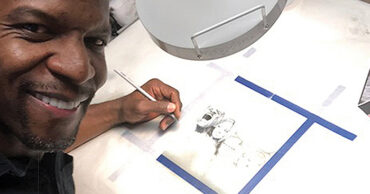
In the opening scene of “k3rnel-pan1c.ksd”, Romeo details to Trenton the violent, sordid history of the Fun Society building they housed their now-infamous digital attack in. The monologue basically reads as “murder death suicide death kill gunshot death”, and re-establishes the season premiere’s thoughts on the cyclic behavior of both human beings and human nature; the patterns of life invariably run over and over and over, repeating themselves day in and day out until, inevitably, there’s an internal fatal error. Some, like Elliot’s, can be recovered from, at least temporarily; others, like Romeo, the next glitch in their perfectly maintained system turns out to be their last. No matter how much control we try to exert over something, it’s still privy to the whims of chaos and the random nature of the world: and in that, the heart of Mr. Robot‘s ambitious, epic “k3rnel-pan1c.ksd” is found.
Much of this episode is spent tracing its steps into the past: not only with Romeo and Trenton’s flashback on Coney Island, but extending to Elliot’s behavior and Angela’s career path. The focal point, obviously, is with Elliot; this hour of Mr. Robot very much parallels the third episode of its first season, where Elliot tries to find some semblance of a normal life (which entailed asking out Angela, and drinking Starbucks at Allsafe). However, his past (his father’s death from leukemia at the hands of Evil Corp executives) cycled back around, inevitably leading him down the path to the events of 5/9, and the subsequent fallout, coming full circle as he once again tries to embrace new patterns and structure, utilizing medication to help him find balance.
This time, it’s adderall, and it sends him off the f*cking rails: at various points in this episode, he’s in full Mr. Robot mode ranting about God, picking through his vomit to find said pills, giggling incessantly about the Seinfeld episode “The Marble Rye”, or screaming in excitement on the basketball court watching a game he never cared about before. Instead of embracing the calm and quiet, he’s embracing the energy and paranoia, trying to unravel his mind by reversing the process he experiences losing it: in a very twisted way, it’s his reverse religious pilgrimage, a trip he regularly makes to try and escape the internal, invisible God who speaks truth to all his thoughts.
But old habits and cycles die hard, as we learn from Elliot’s inevitable slide back into his own unreality, the swirling laundry rainbow fading from his eyes: and as the masterfully scripted “k3rnel-pan1c.ksd” observes from every corner of its world, a break from routine hasn’t changed the inevitable. Philip Price remains a man in power, able to ignore the stress in the world around him, still buy out fancy restaurants, and announce himself as Master of the Universe. His entrenched power is perhaps the eye at the center of the Mr. Robot hurricane, the only man who appears to be sure of the world around him, and his dominance over it, to the point he has Angela contemplating whether she’s strong enough to ruin the lives of two men responsible for the environmental problems that led to her mother’s death. Try as she has to escape that path over the last six months by moving to Evil Corp, Angela seeking vengeance for her mother is still something with meaning to her, the very thing she constructs her entire reality around. In that odd way, Evil Corp has become her religion, as FSociety has become Darlene’s (chiding Trenton and Mobley for not understanding the value of the money burning incident), and Mr. Robot has become Elliot’s, even when he’s trying to erase him from his world.
The central metaphor of religion surprisingly never drowns the episode’s wonderfully engaging, literary voice, narrated beautifully by Rami Malek, and set to some of the most Kubrick-ian visuals in recent television history – the painfully obvious The Shining reference aside, the mention of Fidelio’s is a wonderful nod to Eyes Wide Shut, as are the low-angle shots looking up Elliot’s face, akin to A Clockwork Orange‘s most intense close-ups in its second and third acts. All of this doesn’t overshadow Angela and the other members of f.society’s presence, either, in the rare case of Mr. Robot finding balance across all its narratives (save for Tyrell or his kinky ex-wife and whatever the hell she’s up to).
We even get some solo time with Dominique and Ray in this hour, peeling back the layers of two other characters who turn to invisible presences to find comfort and pleasure, and come up equally wanting. “k3rnel-pan1c.ksd”, with its divine focus on the unseen, unheard powers that be, gives great voice to both the power of faith and the danger of self-prophecy (and the illusions that come with it), replacing the digital language of its week-to-week hackery with a deeper exploration of the ones and zeroes that constitute the human psyche. And though it’s an occasionally bumpy ride with some odd tonal shifts (wait, Ray’s a shady motherf*cker?), “k3rnel” is an exciting, declarative hour of Mr. Robot, an epic declaration of the show’s grander thematic ambitions, shining through the prism of the show’s wonderfully evocative direction and terrific performances.
Other thoughts/observations:
- “I will not be owned.”
- We all have gods: Elliot has Mr. Robot, Angela has Philip, and Dominique has Alexa. “When will the world end?”
- Is the Dark Army assassinating people? Let’s hope not, because that takes the whole “omnipotent hacker” thing in an unfortunate direction.
- The reactions from Saul and Jim when Philip says “We’re going to have one more drink” are so telling, and so amazing.
- The way this episode most reminds me of “eps1.2_d3bug.mkv”? The sense of humor this episode has, so often lost among the serious faces and shadow-y rooms of Mr. Robot. The many Elliots walking down the street is probably my favorite single moment of the series.
 Follow Us
Follow Us





